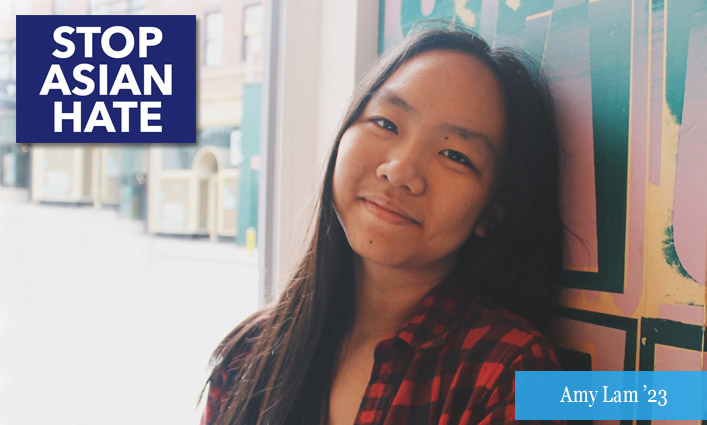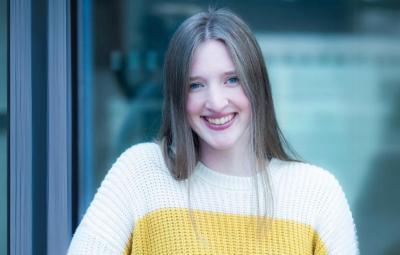
In the midst of a global pandemic, our country has seen a disturbingly sharp rise in anti-Asian attacks, harassment, and rhetoric. As President Karol V. Mason pointed out in her letter to the John Jay community, “Hate is deadly and we cannot be silent when we see it. Instead, we must stand together and confront the rising anti-Asian racism our country is witnessing.” In support of our Asian-American and Pacific Islander (AAPI) community, we recently brought together a group of AAPI students and faculty to express their feelings, thoughts, and concerns in a safe space. With their permission, our “Stop Asian Hate” article series reflects elements of that gathering in an effort to educate the entire John Jay community about AAPI culture, experiences, and history. We hope that their pride in their heritage, and their determination to fight hatred and bigotry, inspires us all to confront anti-Asian racism.
Amy Lam ’23, a Law and Society major, grew up in the Manhattan neighborhood of Chelsea, but her New York City life experiences go much deeper than the trendy hotspots near her home. “Most people come to Chelsea for the art galleries, Chelsea Market, or the High Line. When I tell people that I grew up in Chelsea they say, ‘Oh, do you live in one of those fancy glass buildings with a doorman?’ And I say, ‘Nope. I live in a NYCHA [New York City Housing Authority] building,’” says Lam. Growing up in Chelsea, her primary school classmates were a mix of white children and Black children, but very few other children of Asian descent. “Most of the time, I felt like that token Asian kid. When we had a unit on world culture, and the teacher said, ‘Let’s talk about Japan,’ everyone looked at me. I tried to tell them, “I’m Chinese, not Japanese,” but they hardly knew there was a difference. It’s difficult to explain the difference when you’re eight years old, especially when you’re feeling singled out.” Luckily, Lam had a sanctuary, a place where she didn’t feel singled out or different. “As a kid, I used to go to Chinatown all the time for Chinese school and dance lessons on the weekends. In Chinatown, I could speak my language without people judging me. I could talk to my mom without someone giving me a weird look,” she says, explaining that her mother doesn’t speak English. “I always thought of it as my safe haven.” Lam generously shared her experiences living in our society as a Chinese-American woman.
“In Chinatown, I could speak my language without people judging me. I could talk to my mom without someone giving me a weird look. I always thought of it as my safe haven.” —Amy Lam
What makes you proud of your heritage?
Both of my parents are from the Southern part of China and Hong Kong, but I was born here in America, in New York City. It’s funny, just when you asked me that question, my mom happened to scream at me to drink some herbal soup. I remember how much I hated it when I was a kid. I’ve been sick for the last two weeks and she’s been feeding it to me nonstop. Every time I see my aunt, she’s like, “Do you need more soup?” That’s something I take pride in, the very caring part of my culture.
Where do you see yourself 10 years from now?
Hopefully, I’ll be a lawyer, but I also want to start my own business. I’ve always envisioned having an event planning business because I love planning out everything—whether it’s my life or my classes, I’m a big planner.
What has living through the pandemic been like for you?
Back in 2003, I had family that was impacted by SARS [Severe Acute Respiratory Syndrome]. I was a baby at the time and was lucky enough not to face any complications when I visited, but one family member wasn’t as lucky. That’s why when the news about Covid-19 broke out from China, my family was cautioning me to be very careful. Because of SARS, wearing a mask when you’re feeling sick is a big thing in East Asian cultures.
In February of 2020, I ended up getting a really bad allergy attack. I was up the whole night sneezing and coughing. I knew I wasn’t contagious or sick, but I needed to go to school, so I put on a mask—I was trying to be considerate of other people. I was really tired, but I got on a bus that morning on my way to John Jay. A man walked in the bus, took one look at me, and he spit on me. Then he walked out the back door. I was like, Did you really get on the bus to do that? I just wiped it off and pretended it didn’t happen, but I knew for a fact that it was because of my race. I knew it was because I was wearing a mask. And, I knew it was because of this fear and paranoia about a virus from China. Now, when I look back on it, that was the start of it all. Back then, I didn’t think it could get to the point of murdering six Asian women.
As the pandemic continued, did your concerns deepen or change?
My mom is a home health aide who works a few days a week with the elderly. This past year, I’ve been constantly worried whenever she goes out. I’m lucky, I can stay home while I go to school and do my work, but she can’t. As the rise in anti-Asian hate continues, I’ve gotten more and more paranoid about her safety. Sometimes I bug my brother to pick her up from the train station. It took me a while to realize that the paranoia is justified. Anytime I’m out, I worry about my own safety. I worry about my friends getting home safely. Random acts of anti-Asian violence are a very realistic scenario at this point.
“Random acts of anti-Asian violence are a very realistic scenario at this point.” —Amy Lam
Recently, I went to a Stop Asian Hate rally. I was overwhelmed by the number of people that showed up. My friends and I made cardboard signs with Sharpies, and we tried to listen to the speakers—it was really noisy, but we were cheering anyway. After a while, we decided to leave. So we hid our signs and headed home. It was around sunset when I got on the train. After I sat down, I started scrolling through an Asian news feed on Instagram. Then I saw a post that broke my heart. An Asian woman who had been at the rally was attacked at a subway station and the assailant stole her sign. That could have easily been me. What is wrong with people? I was at an event that was supposed to show solidarity. I was so proud to be there. Then that pride went away literally an hour later.
What can people outside of the AAPI community do to be a true ally?
With the rise of anti-Asian hate crimes, a lot of my white friends immediately turned to me. They weren’t really asking how I was doing, instead it was like, “Did you know this was happening?” Which is really a strange question. Why wouldn’t I know? I’d tell them about specific Asian-American news sources, and I’d say, “You can ask me questions about certain cultures and sub-ethnic groups.” But, they didn’t really want to do that. It was a lot of, I’m here for you, but I’m not really listening to you. That’s what it felt like. I wanted to tell them, You’re not here for me, you just don’t want to feel racist, which is very unfair and makes me feel like that token Asian friend. My advice for being a true ally is to educate yourself. I’m not talking about a movie on Netflix or anime. That’s not what education is. Read about the history of how America has abused Asian-Americans, and how Asian-Americans have used American laws to gain reparations—like with Japanese Americans, after living through the internment camps. Read materials that explain what our parents lived through and what our ancestors lived through. It’s not that hard.
“My advice for being a true ally is to educate yourself.” —Amy Lam
Who do you look up to in the AAPI community to give you hope and inspiration? Why is this person such a powerful figure for you?
Patrick Mock, he’s the General Manager at 46 Mott, which is a small bakery in Chinatown. Even though I don’t know him at all, I have heard of him and all the work that he has done during the pandemic to help others. He has been such an inspiration to me because he is reaching out to the elderly community and the homeless community in Chinatown. He has been giving them food, masks, and any resources they need. He is doing hero work. He also spearheaded this project to revitalize Chinatown over the winter. There were lanterns hanging on Mott Street and Chinatown businesses were serving food and drinks. It made me super happy and super proud.
Finish this sentence: I’m proud to be Chinese-American because…
I’m proud to be Chinese-American because I’m able to incorporate Chinese culture and a community of taking care of each other into a more individualistic American world.
To protect and support our AAPI communities, use these resources as a guide to help #StopAsianHate.



